Emotional Intelligence and Academic Success in Students
VerifiedAdded on 2021/02/20
|8
|1413
|363
Report
AI Summary
This report examines the multifaceted role of emotional intelligence (EI) in students' lives, encompassing its impact on academic performance, emotional management, and overall well-being. The paper begins by defining EI and its components: perceiving, using, understanding, and managing emotions. It explores how EI develops and its significance in fostering successful relationships, self-motivation, and effective communication among students. The literature review investigates the association between study level and EI, highlighting that EI generally increases with age and positively correlates with academic success. It also addresses how strengthening EI brings balance to students' lives by enabling them to manage stress and make effective decisions, particularly in challenging financial conditions. The research synthesizes findings from various studies, emphasizing the benefits of strong EI in navigating financial stress, enhancing decision-making, and improving student performance and productivity. The report concludes that students with high EI are better equipped to handle challenges, maintain healthy relationships, and achieve their goals, making it a crucial factor for success both inside and outside the classroom. The report also provides a comprehensive list of references to support the findings.
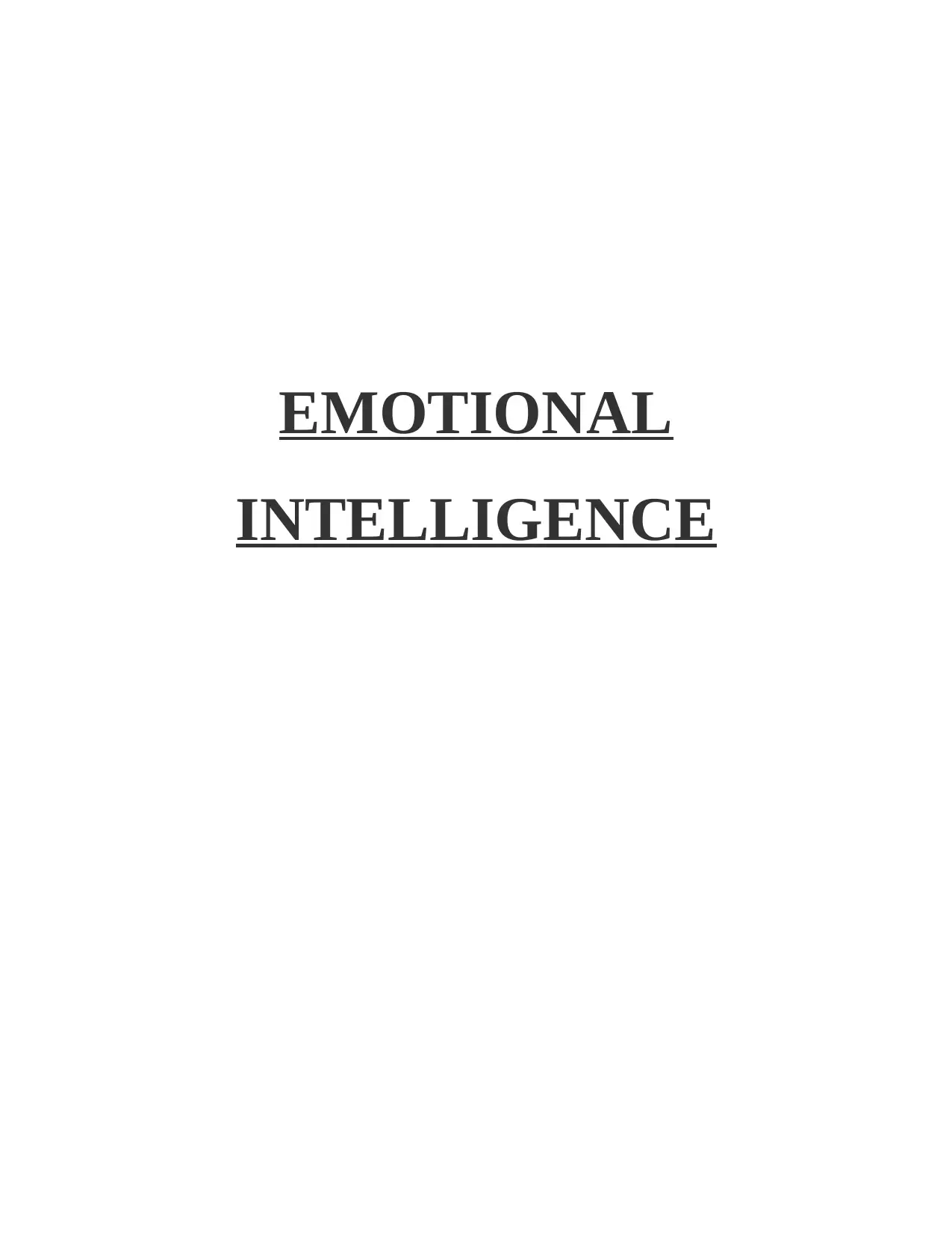
EMOTIONAL
INTELLIGENCE
INTELLIGENCE
Paraphrase This Document
Need a fresh take? Get an instant paraphrase of this document with our AI Paraphraser
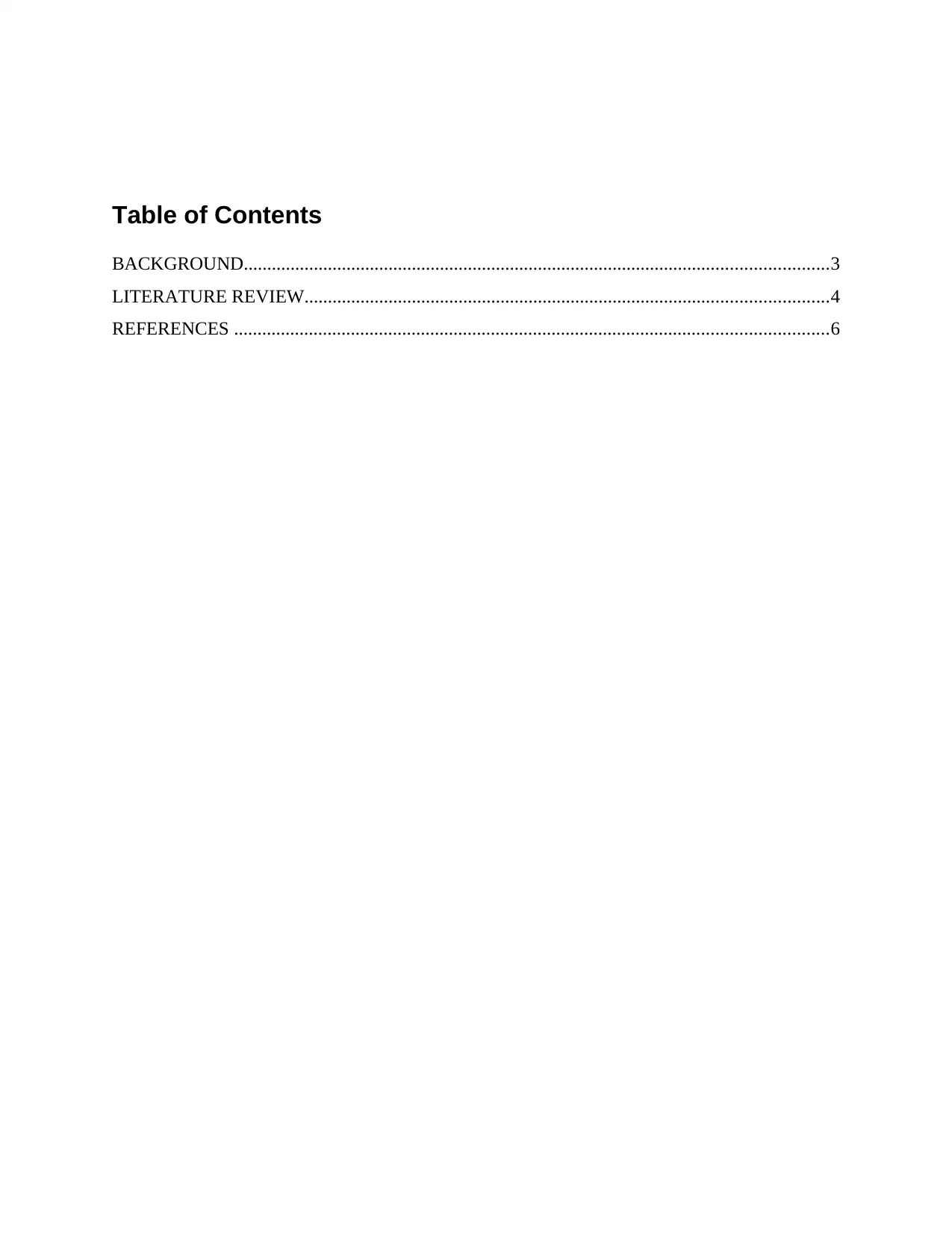
Table of Contents
BACKGROUND.............................................................................................................................3
LITERATURE REVIEW................................................................................................................4
REFERENCES ...............................................................................................................................6
BACKGROUND.............................................................................................................................3
LITERATURE REVIEW................................................................................................................4
REFERENCES ...............................................................................................................................6
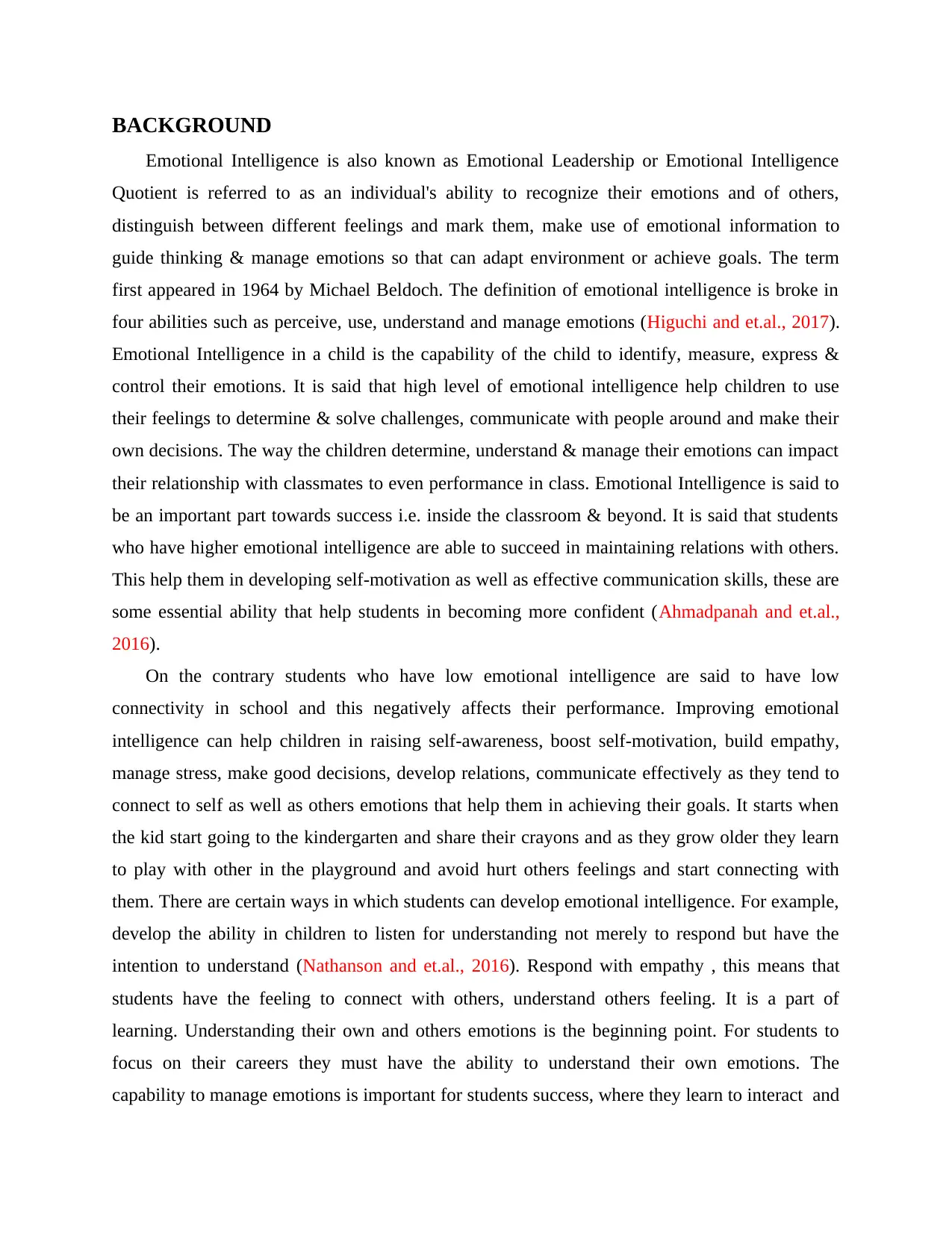
BACKGROUND
Emotional Intelligence is also known as Emotional Leadership or Emotional Intelligence
Quotient is referred to as an individual's ability to recognize their emotions and of others,
distinguish between different feelings and mark them, make use of emotional information to
guide thinking & manage emotions so that can adapt environment or achieve goals. The term
first appeared in 1964 by Michael Beldoch. The definition of emotional intelligence is broke in
four abilities such as perceive, use, understand and manage emotions (Higuchi and et.al., 2017).
Emotional Intelligence in a child is the capability of the child to identify, measure, express &
control their emotions. It is said that high level of emotional intelligence help children to use
their feelings to determine & solve challenges, communicate with people around and make their
own decisions. The way the children determine, understand & manage their emotions can impact
their relationship with classmates to even performance in class. Emotional Intelligence is said to
be an important part towards success i.e. inside the classroom & beyond. It is said that students
who have higher emotional intelligence are able to succeed in maintaining relations with others.
This help them in developing self-motivation as well as effective communication skills, these are
some essential ability that help students in becoming more confident (Ahmadpanah and et.al.,
2016).
On the contrary students who have low emotional intelligence are said to have low
connectivity in school and this negatively affects their performance. Improving emotional
intelligence can help children in raising self-awareness, boost self-motivation, build empathy,
manage stress, make good decisions, develop relations, communicate effectively as they tend to
connect to self as well as others emotions that help them in achieving their goals. It starts when
the kid start going to the kindergarten and share their crayons and as they grow older they learn
to play with other in the playground and avoid hurt others feelings and start connecting with
them. There are certain ways in which students can develop emotional intelligence. For example,
develop the ability in children to listen for understanding not merely to respond but have the
intention to understand (Nathanson and et.al., 2016). Respond with empathy , this means that
students have the feeling to connect with others, understand others feeling. It is a part of
learning. Understanding their own and others emotions is the beginning point. For students to
focus on their careers they must have the ability to understand their own emotions. The
capability to manage emotions is important for students success, where they learn to interact and
Emotional Intelligence is also known as Emotional Leadership or Emotional Intelligence
Quotient is referred to as an individual's ability to recognize their emotions and of others,
distinguish between different feelings and mark them, make use of emotional information to
guide thinking & manage emotions so that can adapt environment or achieve goals. The term
first appeared in 1964 by Michael Beldoch. The definition of emotional intelligence is broke in
four abilities such as perceive, use, understand and manage emotions (Higuchi and et.al., 2017).
Emotional Intelligence in a child is the capability of the child to identify, measure, express &
control their emotions. It is said that high level of emotional intelligence help children to use
their feelings to determine & solve challenges, communicate with people around and make their
own decisions. The way the children determine, understand & manage their emotions can impact
their relationship with classmates to even performance in class. Emotional Intelligence is said to
be an important part towards success i.e. inside the classroom & beyond. It is said that students
who have higher emotional intelligence are able to succeed in maintaining relations with others.
This help them in developing self-motivation as well as effective communication skills, these are
some essential ability that help students in becoming more confident (Ahmadpanah and et.al.,
2016).
On the contrary students who have low emotional intelligence are said to have low
connectivity in school and this negatively affects their performance. Improving emotional
intelligence can help children in raising self-awareness, boost self-motivation, build empathy,
manage stress, make good decisions, develop relations, communicate effectively as they tend to
connect to self as well as others emotions that help them in achieving their goals. It starts when
the kid start going to the kindergarten and share their crayons and as they grow older they learn
to play with other in the playground and avoid hurt others feelings and start connecting with
them. There are certain ways in which students can develop emotional intelligence. For example,
develop the ability in children to listen for understanding not merely to respond but have the
intention to understand (Nathanson and et.al., 2016). Respond with empathy , this means that
students have the feeling to connect with others, understand others feeling. It is a part of
learning. Understanding their own and others emotions is the beginning point. For students to
focus on their careers they must have the ability to understand their own emotions. The
capability to manage emotions is important for students success, where they learn to interact and
⊘ This is a preview!⊘
Do you want full access?
Subscribe today to unlock all pages.

Trusted by 1+ million students worldwide
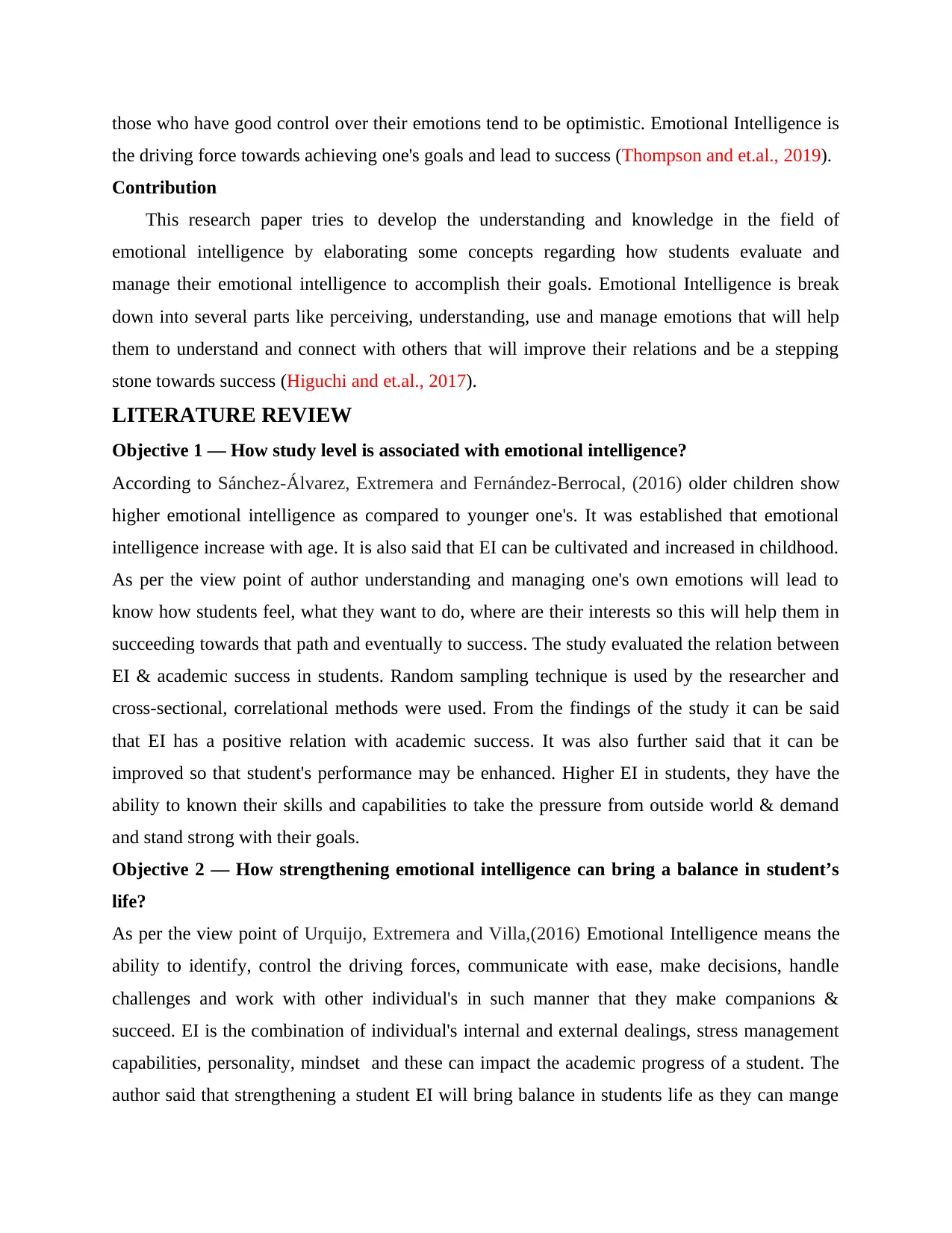
those who have good control over their emotions tend to be optimistic. Emotional Intelligence is
the driving force towards achieving one's goals and lead to success (Thompson and et.al., 2019).
Contribution
This research paper tries to develop the understanding and knowledge in the field of
emotional intelligence by elaborating some concepts regarding how students evaluate and
manage their emotional intelligence to accomplish their goals. Emotional Intelligence is break
down into several parts like perceiving, understanding, use and manage emotions that will help
them to understand and connect with others that will improve their relations and be a stepping
stone towards success (Higuchi and et.al., 2017).
LITERATURE REVIEW
Objective 1 — How study level is associated with emotional intelligence?
According to Sánchez-Álvarez, Extremera and Fernández-Berrocal, (2016) older children show
higher emotional intelligence as compared to younger one's. It was established that emotional
intelligence increase with age. It is also said that EI can be cultivated and increased in childhood.
As per the view point of author understanding and managing one's own emotions will lead to
know how students feel, what they want to do, where are their interests so this will help them in
succeeding towards that path and eventually to success. The study evaluated the relation between
EI & academic success in students. Random sampling technique is used by the researcher and
cross-sectional, correlational methods were used. From the findings of the study it can be said
that EI has a positive relation with academic success. It was also further said that it can be
improved so that student's performance may be enhanced. Higher EI in students, they have the
ability to known their skills and capabilities to take the pressure from outside world & demand
and stand strong with their goals.
Objective 2 — How strengthening emotional intelligence can bring a balance in student’s
life?
As per the view point of Urquijo, Extremera and Villa,(2016) Emotional Intelligence means the
ability to identify, control the driving forces, communicate with ease, make decisions, handle
challenges and work with other individual's in such manner that they make companions &
succeed. EI is the combination of individual's internal and external dealings, stress management
capabilities, personality, mindset and these can impact the academic progress of a student. The
author said that strengthening a student EI will bring balance in students life as they can mange
the driving force towards achieving one's goals and lead to success (Thompson and et.al., 2019).
Contribution
This research paper tries to develop the understanding and knowledge in the field of
emotional intelligence by elaborating some concepts regarding how students evaluate and
manage their emotional intelligence to accomplish their goals. Emotional Intelligence is break
down into several parts like perceiving, understanding, use and manage emotions that will help
them to understand and connect with others that will improve their relations and be a stepping
stone towards success (Higuchi and et.al., 2017).
LITERATURE REVIEW
Objective 1 — How study level is associated with emotional intelligence?
According to Sánchez-Álvarez, Extremera and Fernández-Berrocal, (2016) older children show
higher emotional intelligence as compared to younger one's. It was established that emotional
intelligence increase with age. It is also said that EI can be cultivated and increased in childhood.
As per the view point of author understanding and managing one's own emotions will lead to
know how students feel, what they want to do, where are their interests so this will help them in
succeeding towards that path and eventually to success. The study evaluated the relation between
EI & academic success in students. Random sampling technique is used by the researcher and
cross-sectional, correlational methods were used. From the findings of the study it can be said
that EI has a positive relation with academic success. It was also further said that it can be
improved so that student's performance may be enhanced. Higher EI in students, they have the
ability to known their skills and capabilities to take the pressure from outside world & demand
and stand strong with their goals.
Objective 2 — How strengthening emotional intelligence can bring a balance in student’s
life?
As per the view point of Urquijo, Extremera and Villa,(2016) Emotional Intelligence means the
ability to identify, control the driving forces, communicate with ease, make decisions, handle
challenges and work with other individual's in such manner that they make companions &
succeed. EI is the combination of individual's internal and external dealings, stress management
capabilities, personality, mindset and these can impact the academic progress of a student. The
author said that strengthening a student EI will bring balance in students life as they can mange
Paraphrase This Document
Need a fresh take? Get an instant paraphrase of this document with our AI Paraphraser
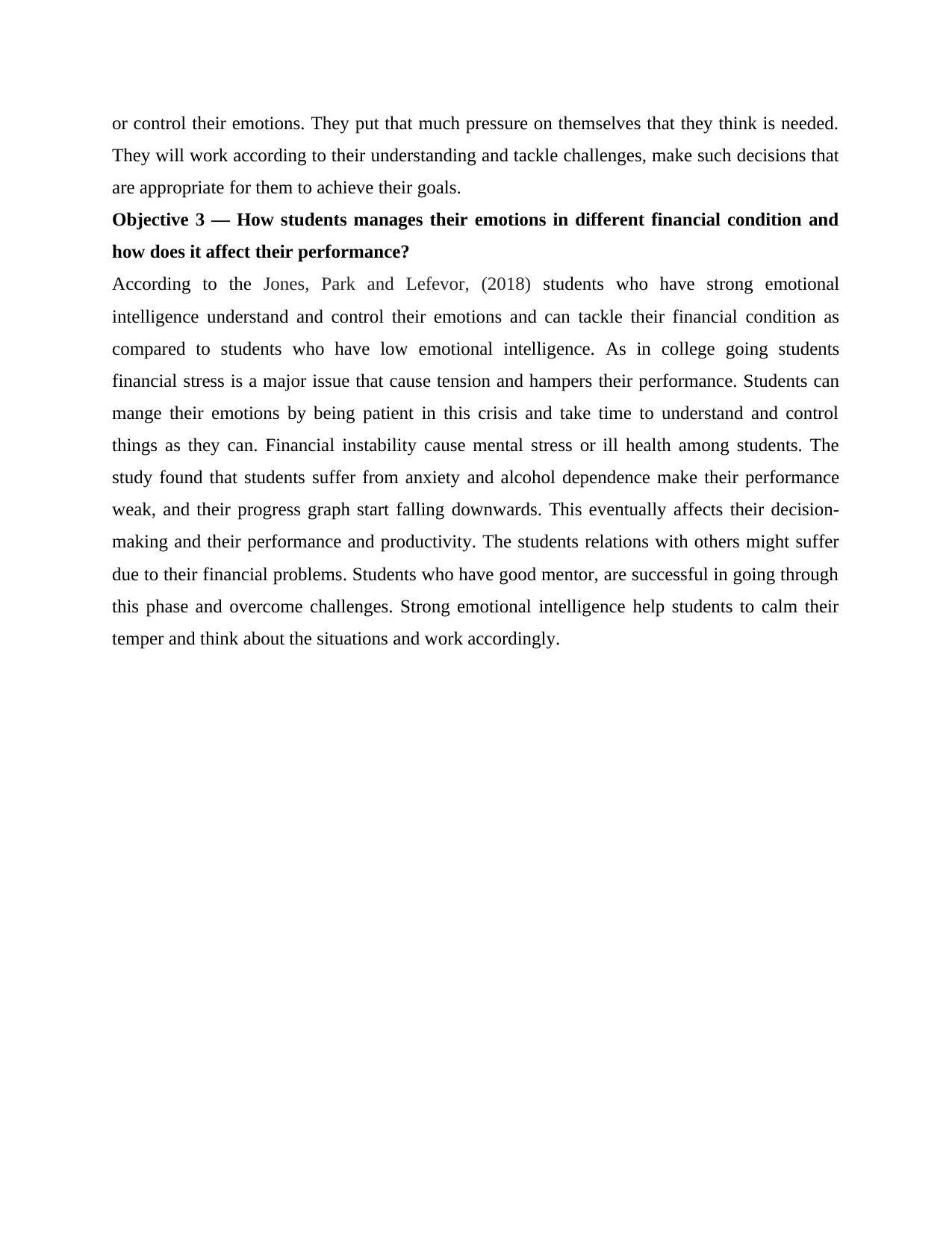
or control their emotions. They put that much pressure on themselves that they think is needed.
They will work according to their understanding and tackle challenges, make such decisions that
are appropriate for them to achieve their goals.
Objective 3 — How students manages their emotions in different financial condition and
how does it affect their performance?
According to the Jones, Park and Lefevor, (2018) students who have strong emotional
intelligence understand and control their emotions and can tackle their financial condition as
compared to students who have low emotional intelligence. As in college going students
financial stress is a major issue that cause tension and hampers their performance. Students can
mange their emotions by being patient in this crisis and take time to understand and control
things as they can. Financial instability cause mental stress or ill health among students. The
study found that students suffer from anxiety and alcohol dependence make their performance
weak, and their progress graph start falling downwards. This eventually affects their decision-
making and their performance and productivity. The students relations with others might suffer
due to their financial problems. Students who have good mentor, are successful in going through
this phase and overcome challenges. Strong emotional intelligence help students to calm their
temper and think about the situations and work accordingly.
They will work according to their understanding and tackle challenges, make such decisions that
are appropriate for them to achieve their goals.
Objective 3 — How students manages their emotions in different financial condition and
how does it affect their performance?
According to the Jones, Park and Lefevor, (2018) students who have strong emotional
intelligence understand and control their emotions and can tackle their financial condition as
compared to students who have low emotional intelligence. As in college going students
financial stress is a major issue that cause tension and hampers their performance. Students can
mange their emotions by being patient in this crisis and take time to understand and control
things as they can. Financial instability cause mental stress or ill health among students. The
study found that students suffer from anxiety and alcohol dependence make their performance
weak, and their progress graph start falling downwards. This eventually affects their decision-
making and their performance and productivity. The students relations with others might suffer
due to their financial problems. Students who have good mentor, are successful in going through
this phase and overcome challenges. Strong emotional intelligence help students to calm their
temper and think about the situations and work accordingly.
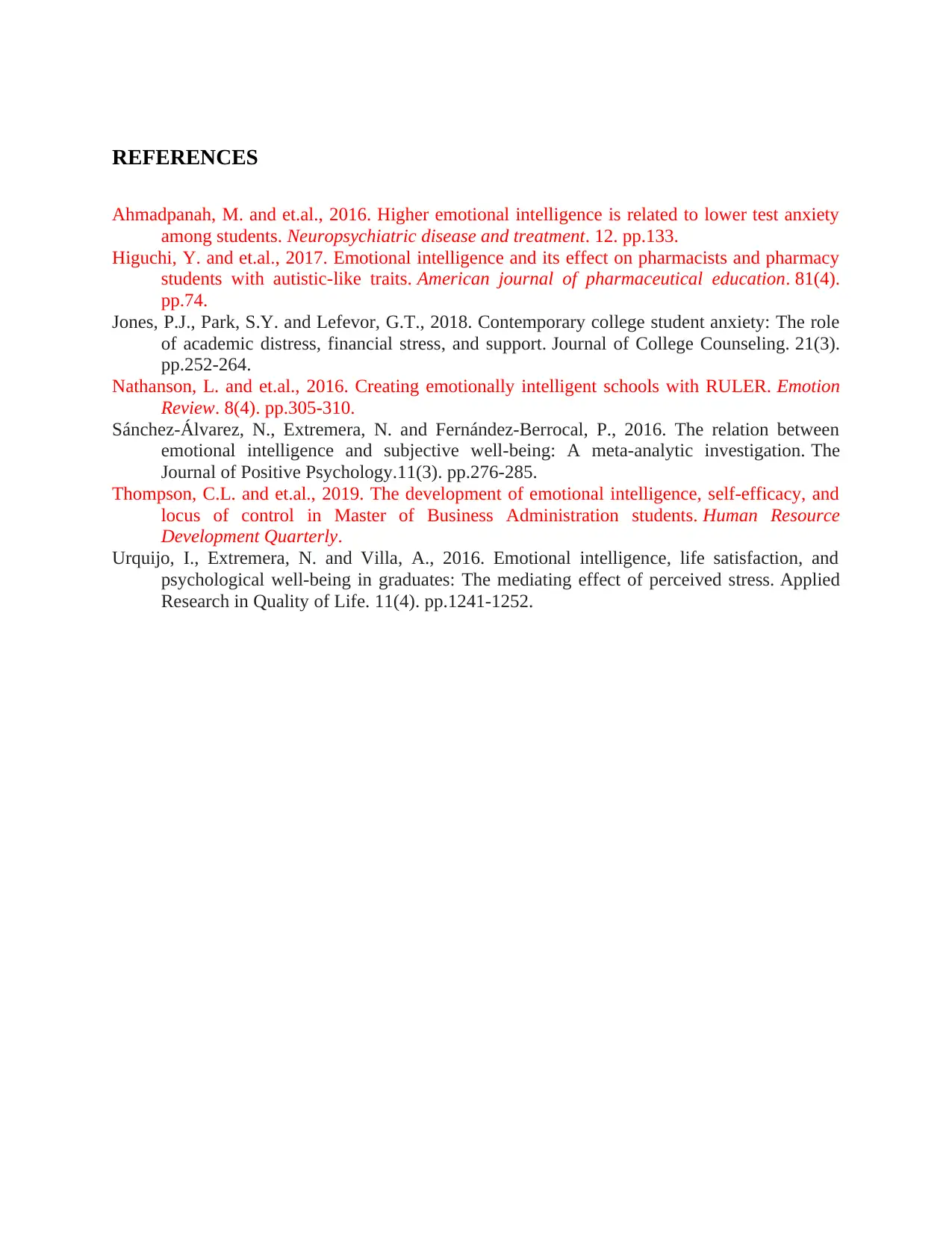
REFERENCES
Ahmadpanah, M. and et.al., 2016. Higher emotional intelligence is related to lower test anxiety
among students. Neuropsychiatric disease and treatment. 12. pp.133.
Higuchi, Y. and et.al., 2017. Emotional intelligence and its effect on pharmacists and pharmacy
students with autistic-like traits. American journal of pharmaceutical education. 81(4).
pp.74.
Jones, P.J., Park, S.Y. and Lefevor, G.T., 2018. Contemporary college student anxiety: The role
of academic distress, financial stress, and support. Journal of College Counseling. 21(3).
pp.252-264.
Nathanson, L. and et.al., 2016. Creating emotionally intelligent schools with RULER. Emotion
Review. 8(4). pp.305-310.
Sánchez-Álvarez, N., Extremera, N. and Fernández-Berrocal, P., 2016. The relation between
emotional intelligence and subjective well-being: A meta-analytic investigation. The
Journal of Positive Psychology.11(3). pp.276-285.
Thompson, C.L. and et.al., 2019. The development of emotional intelligence, self‐efficacy, and
locus of control in Master of Business Administration students. Human Resource
Development Quarterly.
Urquijo, I., Extremera, N. and Villa, A., 2016. Emotional intelligence, life satisfaction, and
psychological well-being in graduates: The mediating effect of perceived stress. Applied
Research in Quality of Life. 11(4). pp.1241-1252.
Ahmadpanah, M. and et.al., 2016. Higher emotional intelligence is related to lower test anxiety
among students. Neuropsychiatric disease and treatment. 12. pp.133.
Higuchi, Y. and et.al., 2017. Emotional intelligence and its effect on pharmacists and pharmacy
students with autistic-like traits. American journal of pharmaceutical education. 81(4).
pp.74.
Jones, P.J., Park, S.Y. and Lefevor, G.T., 2018. Contemporary college student anxiety: The role
of academic distress, financial stress, and support. Journal of College Counseling. 21(3).
pp.252-264.
Nathanson, L. and et.al., 2016. Creating emotionally intelligent schools with RULER. Emotion
Review. 8(4). pp.305-310.
Sánchez-Álvarez, N., Extremera, N. and Fernández-Berrocal, P., 2016. The relation between
emotional intelligence and subjective well-being: A meta-analytic investigation. The
Journal of Positive Psychology.11(3). pp.276-285.
Thompson, C.L. and et.al., 2019. The development of emotional intelligence, self‐efficacy, and
locus of control in Master of Business Administration students. Human Resource
Development Quarterly.
Urquijo, I., Extremera, N. and Villa, A., 2016. Emotional intelligence, life satisfaction, and
psychological well-being in graduates: The mediating effect of perceived stress. Applied
Research in Quality of Life. 11(4). pp.1241-1252.
⊘ This is a preview!⊘
Do you want full access?
Subscribe today to unlock all pages.

Trusted by 1+ million students worldwide

Paraphrase This Document
Need a fresh take? Get an instant paraphrase of this document with our AI Paraphraser

1 out of 8
Related Documents
Your All-in-One AI-Powered Toolkit for Academic Success.
+13062052269
info@desklib.com
Available 24*7 on WhatsApp / Email
![[object Object]](/_next/static/media/star-bottom.7253800d.svg)
Unlock your academic potential
Copyright © 2020–2025 A2Z Services. All Rights Reserved. Developed and managed by ZUCOL.





